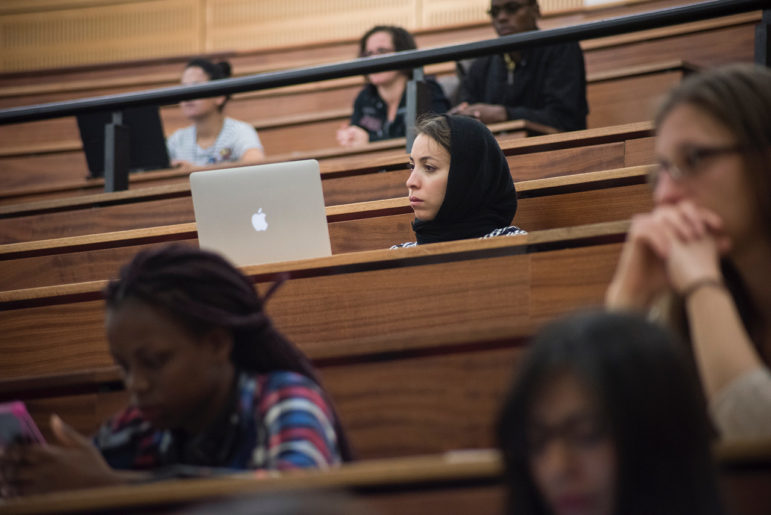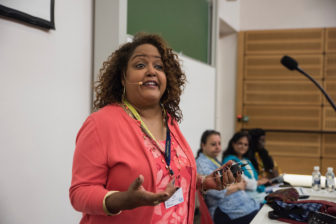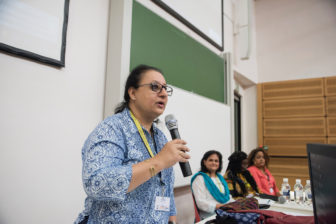
Attendees at the Women in Investigative Journalism panel. Photo: Madelene Cronjé
When Cheryl Thompson joined the Washington Post in 1997, “there were very few black women in investigative journalism,” she said. Twenty years later, “there are still not many black women in investigative journalism. I’m not sure why.”
Thompson joined Catherine Gicheru, Code for Kenya’s country lead, and Indian Express executive editor Ritu Sarin on a panel moderated by Namrata Sharma, head of the Center for Investigative Journalism in Nepal, to share how they succeed in a traditionally male-dominated field.

Washington Post’s Cheryl W. Thompson shared tips on making it in a male-dominated industry. Photo: Madelene Cronjé
1. Protect yourself with accuracy. As women, “we sort of have to stay one step ahead of the guys; we have to give a little extra,” said Thompson. The best way to do this, suggested Sarin, is to “bullet proof that story.”
“My advice is to be honest to the story you are doing, be honest to the source,” said Sarin. Give your subjects a fair amount of time to respond to questions; “leave a trail of text messages and emails that show you actually tried to reach out to them and gave them a week to respond, or at least two days. You cannot call them once in the afternoon and then write in the evening that they did not comment.” In so doing, she said, the people you write about will respect you and even become friends.
2. Be fearless. All of the panelists stressed the need to be courageous and unflinching. “Be fearless,” said Thompson. Sarin said she had found in her years of conflict reporting that “when there’s an incident you [might] notice that the men are more terrified than you are.”
Shrug off the intimidation and vitriol that will almost certainly be thrown your way. “The trolling and shaming is part of the business,” said Sarin. Don’t engage, and if anything, see it as a compliment, said Thompson. “Just smile and keeping it moving.”
3. Ditch the guilt. Women who are mothers often talk about the inner conflict they face leaving their children to go into the workplace. “There’s always that tinge of feeling that you should be there 24 hours a day,” said Sharma speaking after the session. “But if I hadn’t done what I am doing, I wouldn’t be a happy fulfilled person, and I don’t think my son would either. If I ask my son now, he thinks I’m a great mother.”
In some cases, concern for the safety of your family might lead to extreme decisions. For Gicheru, that meant living apart from her children while they were young. “I made a decision not to live with my kids,” she said. “I had to keep them as far away from me as possible, because I know that’s my weak point. I knew that [if my antagonists threatened] my kids, I would weaken,” she said. Despite living apart for years, “we actually have a very close relationship now,” said Gicheru. In many countries, this kind of extreme precaution is not necessary, but where it may be, “it’s a personal decision,” she said.
4. Keep a low profile. For many years, “I tried very hard not to have a photo of myself taken,” said Gicheru. Being anonymous meant she could attend meetings and events without raising the suspicions of those she was investigating. Although nowadays that’s almost impossible, she still recommends “minimizing your digital footprint,” something that Sarin agrees is worthwhile for those who conduct risky investigations.
5. Trust your female instincts. “That’s one advantage we have as women – we have really good instincts,” said Thompson. “Trust them!” Heeding her suspicions about a well-liked county executive, Jack B. Johnson, led to her three-year investigation about the politician and his eventual prosecution and imprisonment for extortion.
6. Mentor other women in the workplace. If you’re in a senior position in your newsroom, make a point of mentoring other junior woman journalists. Be a sounding board, guide them as they structure their stories, and help them prioritize the most important story to chase, suggested Sarin.

Women in Investigative Journalism. Moderator: Namrata Sharma. Speakers: Cheryl W. Thompson, Catherine Gicheru, Ritu Sarin. Photo: Madelene Cronjé
7. Build a network of social support. “You have to find a physical social network who can come and support you, and then take it case by case,” said Sarin. All the panelists with children said they relied on help from parents, in-laws and other relatives for childcare at times.
Gicheru suggested having a trusted friend outside your immediate network with whom you share all the details of every investigation. “If something happens to me … I know the story won’t die with me,” she said.
8. Grab and create your own opportunities. As a female investigative journalist, you need to make things happen for yourself. One way to do this is by learning skills that can set you apart in the newsroom. “How many men in your newsroom can actually analyze data?” said Gicheru. “Why don’t you be the one to learn to do it first? Be the one on the cusp of change, don’t be the one following.”
Lastly, “if you want to do something, don’t wait to be given the opportunity, grab it yourself,” said Gicheru. “Come up with your concept, make sure you’ve covered all the bases and then go out and get your story.”
 Thalia Holmes is a South African freelance journalist specializing in business, health and long-form feature writing. She has won various national awards for her work. Previously she worked at the Mail & Guardian as a business reporter, and was a management consultant in a former life before finding her passion in media.
Thalia Holmes is a South African freelance journalist specializing in business, health and long-form feature writing. She has won various national awards for her work. Previously she worked at the Mail & Guardian as a business reporter, and was a management consultant in a former life before finding her passion in media.
 Madelene Cronjé is an independent photographer based in Johannesburg, South Africa. Formerly a staff photographer at the Mail & Guardian, she specializes in photojournalism and editorial portraiture.
Madelene Cronjé is an independent photographer based in Johannesburg, South Africa. Formerly a staff photographer at the Mail & Guardian, she specializes in photojournalism and editorial portraiture.
